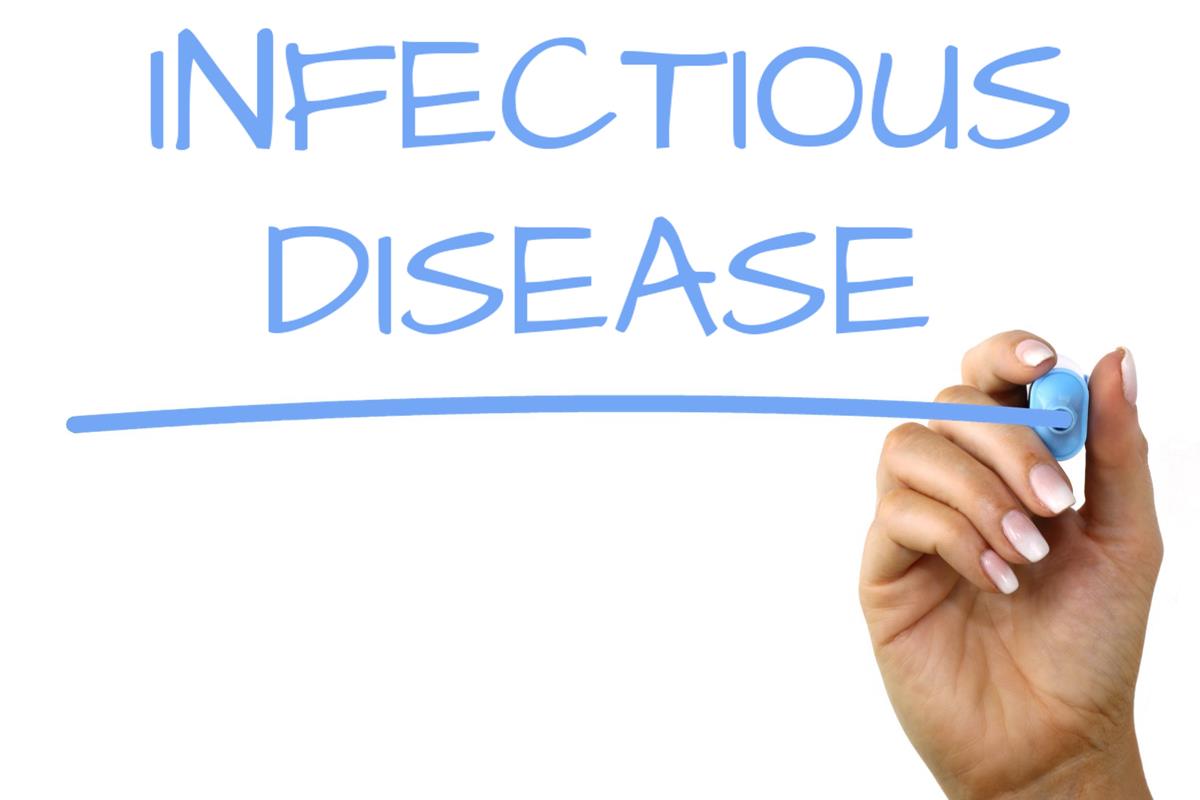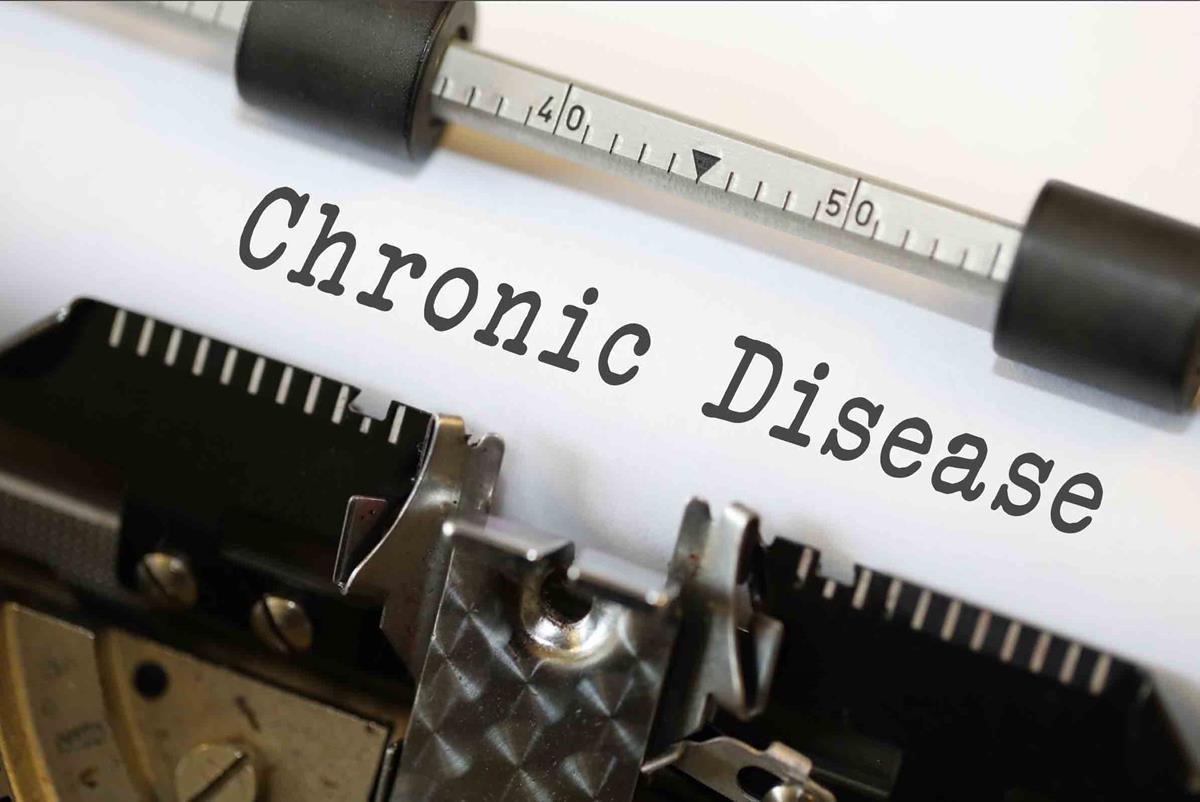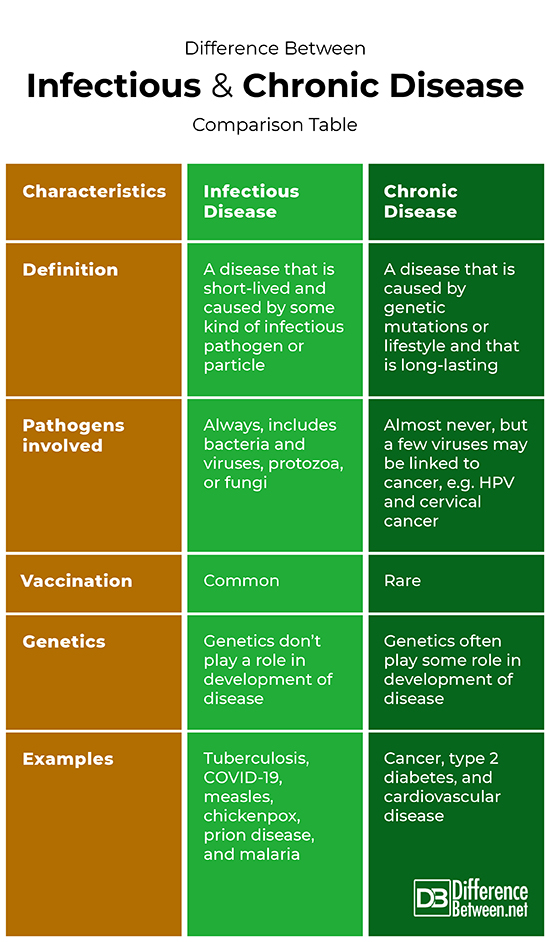Difference Between Infectious and Chronic Disease
An infectious disease is any illness that is the result of some type of infectious agent such as a virus, bacterium, fungus or protozoan. A chronic disease is an illness that lasts many years and is most often due to genetics and lifestyle.

What is Infectious disease?
Definition:
Infectious diseases are any illnesses caused by pathogenic organisms or protein particles that can often also be transmitted to other people. These diseases tend to be acute, with sudden onset, and usually resolve within a year.
Causes of illness:
Living organisms such as parasitic protozoa, fungi, and bacteria often cause infections in people. Non-living pathogens such as viruses and prions can also cause sickness.
Treatment:
Eradicating the pathogen is often the first step in controlling the infectious illness; in the case of bacterial infections, antibiotics can work, and for fungal infections, antifungals. Viruses are difficult to get rid of since they inject themselves into living cells and the person’s immune system is normally how viruses are defeated. Vaccination strategies are the best option for viral infections. There are treatments for protozoan parasites such as Plasmodium, which causes malaria. There is no treatment for diseases caused by prions.
Current issues with infectious diseases:
Some of the most recent illnesses have been outbreaks and epidemics of Ebola, yellow fever and measles. Some of the illnesses such as measles are reoccurring due to people not vaccinating their children. The COVID-19 pandemic is ongoing with many secondary surges in cases occurring. COVID-19 vaccines are being developed and tested for use in the population.
Examples:
There are numerous illnesses caused by bacteria, e.g. tuberculosis, cholera, syphilis, plague, and leprosy. Viral infections that cause infectious diseases include influenza, measles, chickenpox, and COVID-19.

What is Chronic disease?
Definition:
Chronic disease is any illness that lasts a year or longer and is often not curable and can only be managed long-term. The illness tends to develop slowly over many years, with symptoms not being obvious at first, except in the case of certain genetic illnesses such as cystic fibrosis, where symptoms appear rapidly.
Causes of illness:
Often chronic disease is due to either genetics or lifestyle or a combination of both. There are a few rare cases where a virus can trigger a chronic illness, e.g. human papillomavirus can later cause cervical cancer. Genes can directly cause some illnesses such as sickle-cell anemia, cystic fibrosis, and Marfan syndrome. Even illnesses such as asthma are now believed to have an inherited component. Lifestyle is important with many chronic conditions such factors as poor eating habits and lack of exercise is linked to the development of metabolic syndrome; this syndrome often leads to the development of cardiovascular disease or type 2 diabetes. Cancer is caused by damage to DNA, and the cause of the damage varies depending on the type of cancer; for instance excess sun exposure can cause damage to the skin leading to skin cancer.
Treatment:
There is limited treatment for genetically-caused illnesses although new therapies are being developed all the time. Illness caused by lifestyle can sometimes be well managed with a change in lifestyle, but this also depends on how severe the illness is. Type 2 diabetes can sometimes be well controlled with a change in diet and exercise.
Current issues with chronic diseases:
At the moment, chronic diseases such as cancer, type 2 diabetes, and cardiovascular disease are becoming more common in the western world. This is believed to be due to the unhealthy lifestyle that people adopt, and the large number of obese people. In some countries, a sugar tax on food and drink has been imposed to try to encourage people to consume less sugar and make healthier choices.
Examples:
There are many examples of chronic illnesses including cystic fibrosis, Marfan syndrome, sickle-cell anemia, asthma, arthritis, type 2 diabetes, and cardiovascular disease.
Difference between Infectious and Chronic disease
Definition
An infectious disease is acute, short-lived and due to some kind of infectious pathogen or particle. A chronic disease is usually due to genetic mutations or lifestyle factors and lasts a long time.
Pathogens involved
Pathogens are always involved when it concerns infectious illnesses and these include bacteria and viruses, protozoa, or fungi. Pathogens are very rarely a concern with chronic disease, although the virus HPV is linked to cervical cancer.
Vaccination
The use of vaccines is common with infectious disease. The use of vaccines is rare with chronic disease.
Genetics
Gene mutations do not cause infectious illnesses. Gene mutations do cause or play a role in the development of some chronic illnesses.
Examples
Examples of infectious diseases include tuberculosis, COVID-19, measles, chickenpox, prion disease, and malaria. Examples of chronic diseases include cancer, type 2 diabetes, Crohn’s disease, arthritis, asthma, and cardiovascular disease.
Difference between Infectious and Chronic disease: Comparison table

Summary of Infectious and Chronic Disease
- Both infectious and chronic diseases can lead to death if not treated correctly.
- Infectious illnesses tend to occur suddenly and be short-lived.
- Chronic diseases often develop over many years and last a long time.
- Infectious diseases are caused by pathogenic organisms or infectious particles, while chronic diseases are not usually due to pathogens.
- Difference Between Rumination and Regurgitation - June 13, 2024
- Difference Between Pyelectasis and Hydronephrosis - June 4, 2024
- Difference Between Cellulitis and Erysipelas - June 1, 2024
Search DifferenceBetween.net :
Leave a Response
References :
[0]Cohen, Mitchell L. "Changing patterns of infectious disease." Nature 406.6797 (2000): 762-767.
[1]Phillips, Jane Louise, and David C. Currow. "Cancer as a chronic disease." Collegian 17.2 (2010): 47-50.
[2]Wagner, Edward H. "Chronic disease management: what will it take to improve care for chronic illness?." Effective clinical practice 1.1 (1998).
[3]Image credit: https://www.thebluediamondgallery.com/typewriter/images/chronic-disease.jpg
[4]Image credit: https://www.thebluediamondgallery.com/handwriting/images/infectious-disease.jpg
